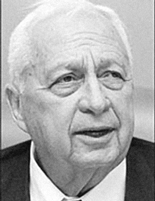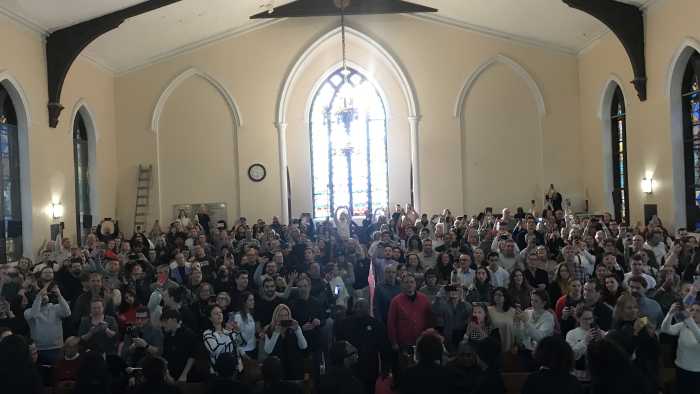By Jerry Tallmer
During or just after the Six Day War of June 5 to10, 1967, there appeared on the Letters to the Editor Page of The New York Times a few short lines from a young woman named Nancy Weber who was just breaking in as a journalist in New York. A photo in that newspaper of an Israeli soldier, rifle in hand, helmet on head, taking a moment for prayer by Jerusalem’s recaptured Western Wall — no Wailing Wall now! — had, she wrote, brought thrilling tears to her eyes that she had never before felt as a Jew.
That letter has stuck in my mind for going on 39 years. Nancy Weber’s emotion was mine too. If it was Hitler who, as they say, made me a Jew, Moshe Dayan & Co. signed, sealed and certified it. I do not believe that even then — certainly not until then — had I ever heard of a general named Ariel Sharon.
At this time in the life of Israel and of Ariel Sharon, I also think of my mother, Ilona Lowenthal Tallmer
Müller-Munk, who died on Lincoln’s Birthday, 1967, four months before the Six Day War that would have brought her to thrilled tears too. I think of her and of something she said about Franklin D. Roosevelt a couple of years after he was gone.
Long before that, when I was a kid, long before my parents were divorced, my father, Albert F. Tallmer, on every Lincoln’s Birthday would pull down “Leaves of Grass” and read aloud to me and my brother Whitman’s agonized lines on the murdered president who had saved the Union:
O Captain! my Captain! our fearful trip is done;
The ship has weather’d every rack, the prize we sought is won;
The port is near, the bells I hear, the people all exulting,
While follow eyes the steady keel, the vessel grim and daring:
But O heart! heart! heart!
O the bleeding drops of red,
Where on the deck my Captain lies,
Fallen cold and dead….
My New York-born-and-bred mother was fluent in French and German but spoke not two words of Yiddish, and one of them sprang from a favorite family story about an Aunt Gizella (I think it was) who stepped into her limo one fine evening and commanded her chauffeur: “Schlepp me to the Ritz, James!” My father’s sole observable tie to formal Judaism was, once a year, not to go to the office on Yom Kippur. In late life he turned to Ethical Culture.
Not long ago I wrote a profile of Barney Rosset, the publisher whose Grove Press had broken barriers of censorship from D.H. Lawrence onward. In our conversation Barney said that his parents had given him no religion of any sort. I said: “Mine too.” In Barney’s case, he became a Communist. “That was my religion, and you better believe it.” For my part, I read through the entire King James Bible sophomore year of college, and came out convinced that Jesus was the first Communist. Which I suppose amounts to the same thing, without party card or obeisance.
Like Barney, I was not bar mitzvahed. Have been in a synagogue maybe three times in my life, once on a high school field trip, later for a couple of funerals. Was, in my 20s, so negative toward formation of the State of Israel that Freda Kirchwey, my first boss, editor of The Nation magazine, took to calling me “the old Arab.” And I did in fact now and then express forebodings about Jews moving in on Arab lands.
If the Six Day War, 20 years later, changed me 180 degrees overnight … and even if I’d been right in those forebodings, 20 years earlier … well then, I’d been right, but who cares? That was then, this is now.
And right now, Ariel Sharon, hero of countless wars, crosser of the Nile, invader of Lebanon, Butcher of Beirut, inflammator of infitada — he who incredibly, miraculously swung 180 degrees virtually overnight to save the lives of his people and his State — lies fallen cold if not yet dead.
I was at my mother and stepfather’s house in Pittsburgh for her 65th birthday, shortly after the assassination of John F. Kennedy. She talked about a cab driver she’d had coming home from the office on the day of the assassination — a cab driver who had said something to the effect of who the hell cares. “I care,” my mother had said. “He was our president! My president.”
In a very early issue of The Village Voice — April 1956 — four of us on the paper who had been enlisted men in World War II wrote about how it had been for us on the day Roosevelt died, an April 11 a decade earlier. Wherever we were that day — Ed Fancher in the 10th Mountain Division in Italy, Dan Balaban in the Signal Corps elsewhere in Italy, Dan Wolf on a cot in Luzon, myself at an aircraft-recognition class in a tent on Guam — we had each and all suddenly, hollowingly felt as if our own father had just died.
A couple of years after the death of Roosevelt — along about 1950, when the nation and the world seemed coming apart at the seams, and Harry Truman, at that stage of the game, gave no more hope than a bump on a log — I was sharing my despair with my mother, who was no less bleak about the future.
“When Roosevelt died,” she said, “what you heard everywhere was don’t take it too hard, there is no indispensable man. Well,” said my mother, “I’m afraid there was somebody who was indispensable.”
The stroke that has felled Ariel Sharon is very like the massive cerebral hemorrhage that killed F.D.R. And who or what can fill the gap where Sharon has fallen, the prize he sought not yet won? Maybe nobody. Maybe nothing. Let us pray for another miracle.
Israeli Prime Minister Ariel Sharon







































